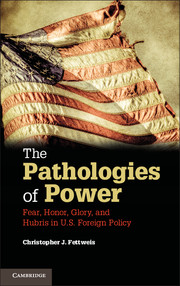3 - Glory
Hypercompetitiveness and U.S. Foreign Policy
Published online by Cambridge University Press: 05 June 2014
Summary
“We need to out-innovate, out-educate, and out-build the rest of the world,” said President Obama in his 2011 State of the Union Address. “That’s how we’ll win the future.” In case anyone missed the theme, the president referred to “winning the future” eight more times during the speech, explaining after each how his administration planned to increase its efforts to lead the United States to victory. In many areas, the United States was losing to other countries: “Our infrastructure used to be the best, but our lead has slipped. South Korean homes now have greater Internet access than we do. Countries in Europe and Russia invest more in their roads and railways than we do. China is building faster trains and newer airports.” All of this and more must be addressed if the future is to be won. “By the end of the decade,” he predicted, if we pull together and enact wise policies, “America will once again have the highest proportion of college graduates in the world.”
The president knew his audience. He could have hardly picked a slogan with a greater potential to resonate powerfully with the American people, who are among the most competitive on earth. In fact, whenever its status as The Greatest is threatened – whether it be at the hands of Serbian basketball players, Indian science students, or Chinese high-speed rail – the public demands action. The United States cannot countenance being number two in any important category, at least not without a struggle. National glory, though rarely discussed, is an important motivator for action.
- Type
- Chapter
- Information
- The Pathologies of PowerFear, Honor, Glory, and Hubris in U.S. Foreign Policy, pp. 141 - 183Publisher: Cambridge University PressPrint publication year: 2013

